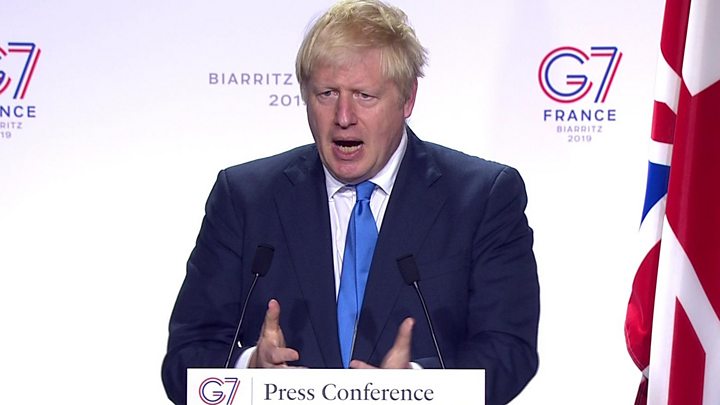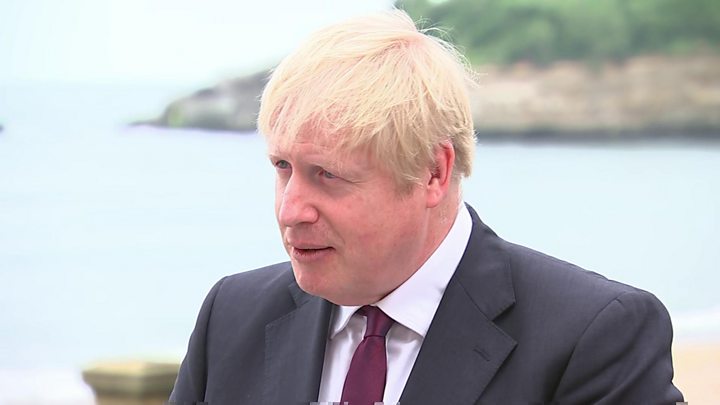Brexit: Job of Parliament is to ‘get this thing done’ – Johnson

Media playback is unsupported on your device
“The job of everybody in Parliament” is to deliver Brexit, the PM has said at the end of the G7 summit in France.
Boris Johnson also said he was “marginally more optimistic” about striking a new Brexit deal with the EU.
But he refused to be drawn on whether he would suspend Parliament to stop it preventing a no-deal exit.
Mr Johnson’s comments come as MPs from other parties prepare to meet to discuss ways to avoid the UK leaving the EU without a deal on 31 October.
Labour leader Jeremy Corbyn hopes to win a vote of no confidence in the government and then delay Brexit to stop a no-deal exit.
Asked about the possibility of MPs thwarting plans to leave the EU at the end of October, Mr Johnson said: “I think it’s the job of everybody in Parliament to get this thing done.
“I think it’s what the people want, I also think, by the way, it’s what our friends and partners on the other side of the Channel want – they want it over.”
On Sunday, Mr Johnson had told the BBC the chances of securing a new Brexit deal were “touch and go” – but on Monday he said: “I am marginally more optimistic.”
He continued: “But, remember that all statistical estimates that I give about the chances of a deal – whether they are expressed in odds of millions to one, or getting closer, or hotter or colder, or whatever – they all depend exclusively on the willingness of our friends and partners to compromise on that crucial point and to get rid of the backstop and the current withdrawal agreement.”
Vote of no confidence
Labour leader Mr Corbyn wants to call a vote of no confidence in the government to prevent a no-deal Brexit.
If he were to win a vote, Mr Corbyn plans to become a caretaker prime minister, delay Brexit, call a snap election and campaign for another referendum.
However, in Biarritz on Monday, Mr Johnson reiterated his determination to stop Mr Corbyn becoming prime minister.
“One of my many missions in life is to protect the people of this country from the appalling consequences of a Labour government,” Mr Johnson said.
He added that Mr Corbyn, if in power, “would also renege, reject, revoke the mandate of the people”.
“I cannot think of anything worse for democracy or for trust in politics and I very much hope that does not happen,” he said.

Media playback is unsupported on your device
Beginning his final speech at the G7 summit – a get-together of most of the leaders of the world’s largest economies – Mr Johnson said that in “every conversation” he had had with his fellow leaders, he had been “struck by their enthusiasm to expand and strengthen their relations with our country”.
He added the subjects discussed included “the biggest global challenges confronting us all today”.
Referencing both the fires in the Amazon rainforest and a global decline in biodiversity, Mr Johnson said nations could not just “sit back as animals and plants are wiped off the face of the planet”.
Divorce bill
The summit comes just two months before the UK is scheduled to leave the EU.
Mr Johnson previously said if the UK left without a deal, the UK would keep a “very substantial” part of the £39bn former prime minister Theresa May had agreed to pay the EU in her withdrawal agreement – the deal which British MPs rejected three times.
But, responding, European Commission spokeswoman Mina Andreeva said the UK must honour commitments made during its EU membership, and said this was “especially true in a no-deal scenario”.
She said that “settling accounts is essential to starting off a new relationship on the right foot”.
Guy Verhofstadt, the European Parliament’s Brexit co-ordinator, said: “If the UK doesn’t pay what is due, the EU will not negotiate a trade deal.”
The SNP, Liberal Democrats, Change UK, Plaid Cymru and the Green Party have all accepted an invitation to meet Mr Corbyn to discuss his proposals to avert a no-deal Brexit on Tuesday.
But Lib Dem leader Jo Swinson said Mr Corbyn’s plans risks jeopardising a potential vote of no confidence in the government.
She said the discussions should examine how to seize control of Commons business, oust Mr Johnson and install an emergency “government of national unity”.
The Labour leader’s insistence on being interim leader meant there was a danger not enough MPs would support the vote, Ms Swinson said.




